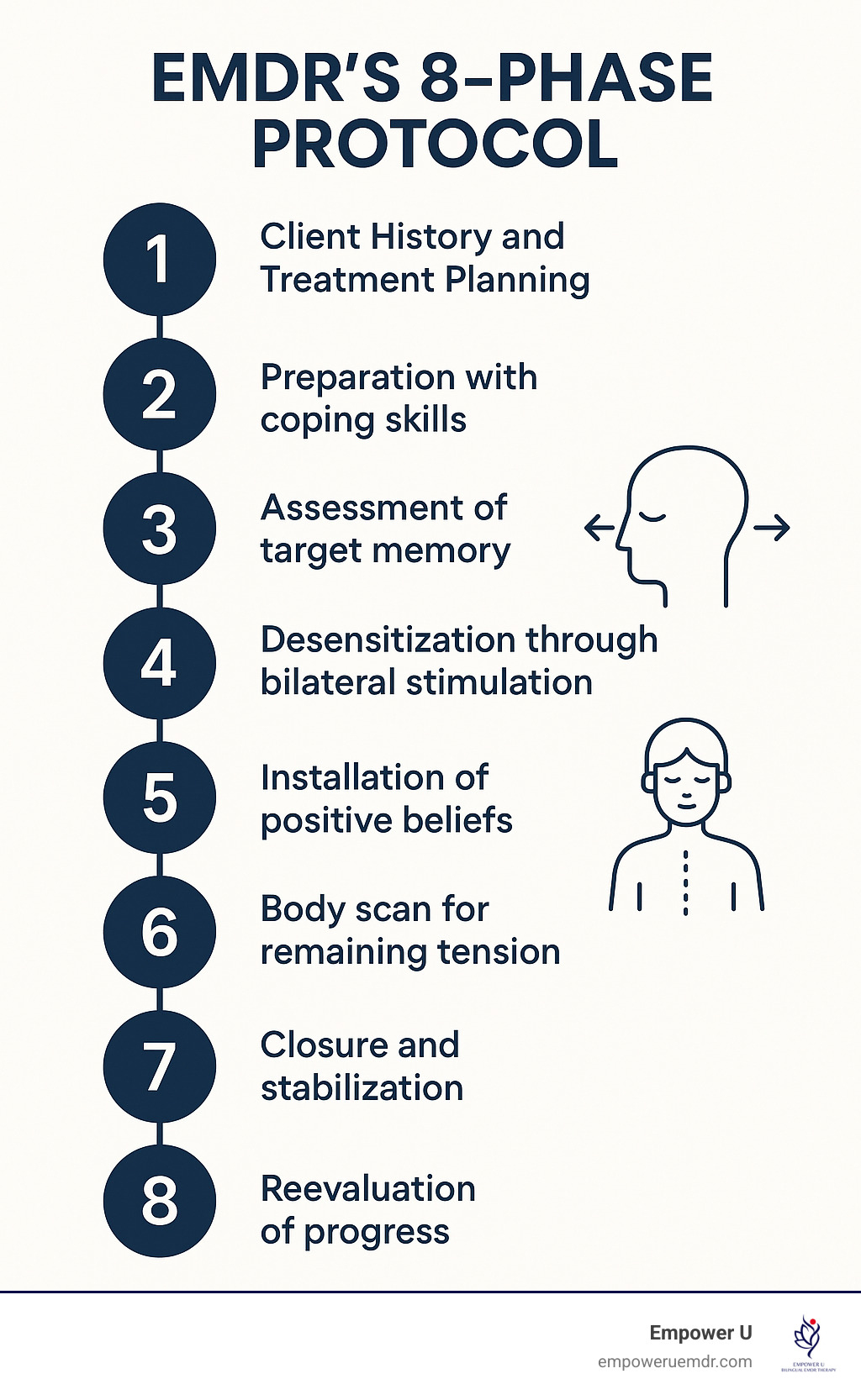EMDR Therapy in Irvine, CA: Healing Trauma for Adult Children of Immigrants

Why EMDR Therapy is Transforming Mental Health Treatment in Irvine
If you're an adult child of immigrants feeling stuck between two worlds, constantly questioning where you belong, you're not alone. As a bilingual EMDR therapy specialist in Irvine, I understand the unique pain of feeling torn between your family's cultural values and the mainstream culture around you. The guilt, anxiety, and self-doubt that come from this internal conflict can feel overwhelming—but emotional healing is possible.
Eye Movement Desensitization and Reprocessing (EMDR) therapy at Empower U offers a powerful, extensively researched approach to healing trauma that often works faster than traditional talk therapy. This innovative EMDR treatment helps you process traumatic memories and distressing experiences so they no longer control your emotional responses, allowing you to reclaim your authentic self while honoring your cultural heritage.
My Journey: From Engineering to EMDR Therapy
I switched careers from engineering to therapy as part of my own therapeutic journey of reconnecting with myself and redefining my identity. As a bicultural immigrant in a biracial, bicultural marriage raising three American children, I deeply understand the life challenges of navigating between cultures. Spanish is my first language, and this lived experience helps me create a safe, culturally sensitive space where my clients feel truly seen and understood.
I don't see people as broken—I help them make sense of their mental health concerns by looking at the bigger picture of their lives. My goal is to help you feel more at peace, more confident, improve your relationships, and feel empowered to live as your full, authentic self.
What Is EMDR Therapy & How Does It Work?
EMDR therapy is built on your brain's natural ability to heal from traumatic experiences and other distressing life experiences. When traumatic memories get "stuck," they can keep triggering intense emotions, physical sensations, and negative beliefs about yourself—even years later. Your brain treats these old memories as if they're happening right now, creating ongoing emotional distress.
EMDR relies on something called adaptive information processing—your brain's built-in healing system. During EMDR therapy sessions, you'll focus on a specific difficult memory while following guided eye movements or other forms of bilateral stimulation. This eye movement desensitization and reprocessing technique helps both sides of your brain communicate better, allowing for more complete processing of what happened to you.
Many clients describe feeling "unstuck" after EMDR treatment—like the distressing memories finally have a place to go instead of circling around in their minds. Research shows that this movement desensitization and reprocessing approach can create significant improvements in fewer sessions compared to many traditional therapy approaches.

The EMDR Therapy Process: Your Roadmap to Healing
Phase 1: Understanding Your Story in Context I take time to understand your background, cultural context, and family systems. We identify which traumatic experiences, significant life events, or life transitions need processing, always within the framework of your bicultural identity. This comprehensive assessment helps create your personalized treatment plan.
Phase 2: Building Your Foundation Before diving deep, we focus on creating safety and stability. I teach you grounding techniques and emotional regulation tools from dialectical behavior therapy that make daily life more manageable and help you feel less stuck.
Phase 3: Assessment & Targeting We look closely at the specific target memory we're working on, identifying the emotions, physical sensations, and negative beliefs connected to it. This careful assessment is crucial for effective EMDR treatment.
Phase 4: Processing & Desensitization Using bilateral stimulation while you recall the memory, we help reduce its emotional impact. This is where the real healing happens as your brain reprocesses the traumatic event.
Phase 5: Installation We strengthen positive beliefs about yourself to replace those negative ones that past trauma left behind, building stronger self esteem and emotional resilience.
Phases 6-8: Integration & Closure We ensure you feel stable and grounded, and we check that the changes hold strong over time, supporting your ongoing therapeutic journey.
EMDR Treatment vs. Traditional Talk Therapy: What Makes It Different
While traditional talk therapy focuses on discussing and analyzing your thoughts and feelings, EMDR therapy creates actual neurobiological change by directly targeting how traumatic memories are stored in your brain. This is why many people find EMDR treatment more effective when traditional therapy approaches haven't provided enough relief for their mental health issues.
Key Differences:
- Often requires fewer sessions than traditional therapy approaches
- Addresses trauma stored in your body through physical sensations, not just your thoughts
- You don't need to extensively discuss or analyze your traumatic experiences
- Minimal homework—the EMDR therapy work happens during our sessions
- Creates lasting changes at the memory level through eye movement desensitization
Who Can Benefit from EMDR Therapy?
Mental Health Disorders and Trauma-Related Conditions
EMDR therapy has been extensively researched for treating various mental health conditions. While originally developed for post traumatic stress disorder, decades of research have shown its effectiveness for a much broader range of mental health concerns.
Anxiety Disorders: If you experience panic attacks, social anxiety, or panic disorders, EMDR can target the underlying traumatic memories that fuel these fears. The emotional distress from cultural trauma often manifests as persistent anxiety about disappointing your family.
Depression and Mood Disorders: When depression stems from past traumatic experiences or deeply held negative beliefs about yourself, EMDR therapy can create significant shifts in how you view yourself and your worth.
Trauma and PTSD: Whether you've experienced a single traumatic event, ongoing complex trauma, or childhood trauma, EMDR helps your brain process these experiences so they no longer control your emotional responses.
Cultural Trauma & Identity Struggles
As an adult child of immigrants, you may carry wounds from discrimination, feeling like you don't fully belong anywhere, or the painful disconnection from your roots. This generational trauma can create ongoing mental health issues that EMDR therapy can effectively address.
Complex Life Challenges
Growing up navigating different cultural expectations creates confusing messages about who you should be. These other distressing life experiences often include feeling responsible for your parents' happiness while trying to live your own life.
You might be an excellent candidate for EMDR treatment if you:
- Have experienced trauma or significant life events that still feel emotionally charged
- Feel stuck despite trying other therapies
- Struggle with anxiety disorders, depression, or overwhelming guilt
- Experience chronic pain that may be trauma-related
- Want to heal at the root level, not just manage symptoms
- Have eating disorders connected to cultural shame or identity issues
What to Expect: Your First EMDR Therapy Session & Beyond
The First Session – Beginning Your Story
In our first full EMDR therapy session (50 minutes), I'll invite you to begin sharing your story at your pace. We'll talk about what brings you in, the patterns you've noticed, and the hopes you have for your mental health. I listen deeply, without judgment, asking gentle questions to help you reflect on the context of your pain—your family systems, cultural background, identity, or life transitions.
We're not looking for what's "wrong" with you. We're looking for meaning, connections, and ways to reclaim your voice and power through the therapeutic relationship we'll build together.
What to Expect Once We Begin Your EMDR Therapy Process
Step 1: Understanding Your Story in Context I listen closely with deep curiosity and care, understanding your traumatic experiences through the lens of your cultural background, family systems, generational influences, and current life stage. I often use a timeline to map out significant life events, helping us both see patterns and turning points that have influenced your mental health.
Step 2: Clarity, Education & A Plan As we explore your story, I provide psychoeducation about what may be happening emotionally and relationally, so you gain perspective and feel more empowered. I'll explain what I see as the core problem and our collaborative treatment plan for working through it together.
Step 3: Building Resources for Daily Life Before diving deep with EMDR treatment, we focus on creating safety and stability. I support you in building coping tools that make daily life more manageable, including emotional regulation strategies and grounding techniques that address physical sensations and emotional distress.
Step 4: Understanding Your Internal System Through Internal Family Systems (IFS)-informed work, we compassionately explore different parts of you—those protective inner voices that developed to help you survive but may now cause pain or keep you feeling stuck.
Step 5: Healing the Root with EMDR Therapy Once you feel safe and resourced, we use eye movement desensitization and reprocessing to explore and reprocess the root causes—often early traumatic memories or experiences that shaped painful beliefs about yourself.
Step 6: Rebuilding Self Esteem from the Inside Out We integrate practices that help you live with greater purpose and awareness, build self-respect and self-trust, and assert your needs and values in daily life, supporting lasting emotional healing.
My Therapeutic Approach: More Than Just EMDR Treatment
While EMDR therapy is a powerful tool for addressing mental health disorders, I believe in meeting you exactly where you are in your healing journey. I integrate several evidence-based approaches to provide comprehensive mental health support:
Narrative Therapy helps you rewrite your story and reclaim your voice within your cultural context, addressing how past trauma has shaped your identity.
Cognitive Behavioral Therapy (CBT) assists in recognizing and shifting thought patterns that keep you stuck in cycles of self-doubt and anxiety, working alongside EMDR therapy for comprehensive healing.
Dialectical Behavior Therapy (DBT) provides essential skills for managing overwhelming emotions and physical sensations, particularly when you're caught between conflicting cultural expectations that create ongoing emotional distress.
Internal Family Systems (IFS) recognizes that we all have different "parts"—like the part wanting to please your parents, the part craving independence, and the part exhausted from trying to be everything to everyone.
Trauma Therapy Approaches beyond EMDR help address the complex ways that generational trauma and cultural identity struggles affect your mental health and relationships.
Online Therapy: EMDR Treatment from Your Safe Space
I provide online therapy and EMDR treatment throughout California, which offers unique advantages for busy professionals and parents managing multiple life challenges. There's something powerful about processing traumatic experiences in the comfort and safety of your own space. Extensively researched studies show that online EMDR therapy can be just as effective as in-person treatment when conducted by properly trained EMDR specialists.
For bilateral stimulation during online EMDR therapy sessions, we have several effective options including following eye movements on screen or using tactile devices that create the same therapeutic benefits. I use HIPAA-compliant platforms to ensure your privacy and confidentiality throughout your therapeutic journey.
Frequently Asked Questions About EMDR Treatment
How many EMDR therapy sessions will I need? This varies based on your unique mental health concerns and traumatic experiences. Single-incident trauma might require 3-6 sessions, while complex childhood trauma or generational trauma often takes 20+ sessions. Many people experience significant relief in fewer sessions than traditional talk therapy—often 6-12 EMDR therapy sessions, which represents faster progress for many mental health issues.
Is EMDR therapy safe? EMDR treatment is considered safe when conducted by properly trained EMDR specialists with specialized training. You remain in complete control throughout the EMDR therapy process. While processing traumatic memories can temporarily intensify emotions and physical sensations, this is normal and part of the healing journey.
How do I know if my EMDR treatment is working? Progress in EMDR therapy is often measurable. During the EMDR therapy process, you'll likely notice the target memory becoming less vivid or feeling more distant. Between sessions, many clients sleep better and have fewer intrusive thoughts. Long-term, processed traumatic memories feel like "just a memory" rather than something that controls your emotional responses.
What makes you different from other EMDR therapists? My lived experience as a bilingual, bicultural individual gives me deep insight into the mental health challenges you face. I understand what it's like to question who you are and where you belong. This personal understanding, combined with specialized training in trauma therapy and EMDR treatment, allows me to create a uniquely safe and effective healing space for addressing mental health concerns specific to cultural identity struggles.
Can EMDR help with relationship challenges? Yes, EMDR therapy can significantly help with relationship challenges, especially when they stem from past traumatic experiences or family systems patterns. By processing the root experiences that created difficulties with trust, intimacy, or communication, many clients find their relationships improve naturally.
Your Journey to Mental Health and Emotional Healing Starts Here
Healing from cultural trauma, anxiety disorders, and the unique mental health challenges of navigating between worlds is possible. You don't have to carry the weight of impossible expectations or live with the constant questioning of your worth and belonging.
As someone who has experienced trauma and walked this path both personally and professionally, I understand that seeking help for mental health concerns is an act of courage, not weakness. You deserve to feel at peace with past trauma and empowered to live as your full, authentic self.
The combination of culturally sensitive care with evidence-based EMDR treatment can help you process traumatic experiences while honoring both your heritage and your individual therapeutic journey. Together, we can help you rewrite your story and heal at the root through eye movement desensitization and reprocessing therapy.
Whether you're dealing with anxiety disorders, depression, panic attacks, or the complex emotional distress that comes from feeling disconnected from your authentic self, there are paths forward. EMDR therapy offers hope for lasting change and emotional healing that addresses mental health issues at their source.
Ready to explore how EMDR treatment might help you heal and reconnect with your authentic self? Reach out today to begin your therapeutic journey with personalized care that understands the unique mental health challenges of being bicultural in today's world. You don't have to walk this path alone.
Empower U Bilingual EMDR Therapy offers online, culturally attuned EMDR treatment specifically designed for adult children of immigrants struggling with trauma, anxiety, and identity challenges. Contact me today to learn more about beginning your healing journey.



